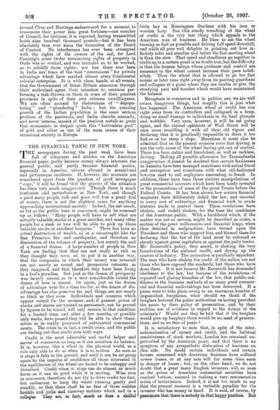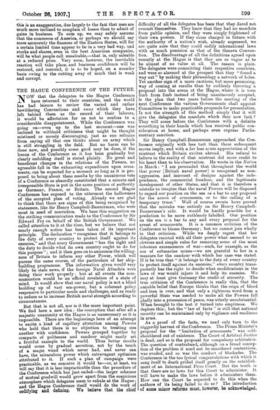THE FINANCIAL PANIC IN NEW YORK.
THE newspapers during the past week have been full of telegrams and articles on the American financial panic, partly because money always interests the general public, and partly because financial panics, especially in America, always abound in sensational and picturesque incidents. If, however, the accounts are considered apart from the question of good newspaper "copy," it will be found that the gravity of the situation has been very much exaggerated. Though there is much confusion and perturbation in New York, and though a good many people, rich and poor, will lose a great deal of money, there is not the slightest cause for anything approaching international anxiety. Indeed, the net result, as far as the public here is concerned, might be summed up as follows : " Many people will have to sell what are actually valuable stocks at a great sacrifice, and many other people for a week or two will be able to pick up those valuable stocks at excellent bargains." There has been no actual destruction of wealth, as in a catastrophe like the San Francisco fire and earthquake, and therefore no diminution of the volume of property, but merely the end of a financial dream. A large number of people in New York are finding that they are not really as rich as they thought they were, or, to put it in another way, that the companies in which their money was invested are not nearly as sound and prosperous concerns as they imagined, and that therefore they have been living in a fool's paradise. But just as the dream of prosperity was largely unreal, so to a very considerable extent the dream of ruin is unreal. Or again, just as the dream of advantage went for a time too far, so the dream of dis- advantage has also gone too far and things are not nearly as black as they seem. Individuals and concerns which appear ruined for the moment, and, if present prices of stocks and shares are treated as permanent, can be proved by figures to be ruined, will only remain in that condition for a limited time, and after a few months, or possibly only weeks, have passed they will be able to show them- selves as in reality possessed of substantial commercial assets. The crisis is, in fact, a credit crisis, and the public are finding out that credit cuts both ways.
Credit is the most admirable and useful helper and server of commerce as long as it can maintain its balance. It is, however, like a wheel in the physical world, as a rule only able to do so when it is in motion. As soon as it stops it falls to the ground, and until it can be set going again by the impulse of confidence all those interested in the equilibrium of the wheel are bound to be unhappy and disturbed. Credit when it stops can do almost as much harm as it can do good while it is moving. Wise men in commerce, therefore, do not try to drive credit too fast, but endeavour to keep the wheel running gently and steadily, so that there shall be no fear of those sudden bounds and jerks and runaway motions which end in a collapse. They act, in fact, much as does a skilful little boy in Kensington Gardens with his iron or wooden hoop. But this steady trundling of the wheel of credit is the very last thing which appeals to the American man of business. He likes to see the wheel turning as fast as possible and driving full speed downhill, and while all goes well delights in pointing out how in- finitely safer and steadier and better the fast-moving wheel is than the slow. That speed and steadiness go together in credit up to a certain point is no doubt true, but the difficulty is that the human beings whose guidance and control are necessary to the wheel cannot increase their pace indefi- nitely. Thus the wheel that is allowed to go too fast sooner or later runs right away from its panting guardians and collapses at a point where they are unable to give the steadying pats and touches which would have maintained the balance.
Metaphors in commerce and in politics are, we are well aware, dangerous things, but roughly this is just what has happened. The American wheel of credit has run right away from its controllers and collapsed in a heap, doing no small damage to individuals in its final plunges and wobbles. Very soon, however, it will be set going again, and the eternal optimists of Wall Street will be once more trundling it with all their old vigour and declaring that it is practically impossible to drive it too fast or on too steep a slope. Meantime it must also be admitted that on the present occasion mere fast driving is not the only cause of the wheel having got out of control. There has been unfair and fraudulent, as well as reckless, driving. Making all possible allowance for Transatlantic exaggeration, it cannot be doubted that certain businesies in America have been managed sometimes with actual fraud and corruption, and sometimes with what old-fashioned lawyers used to call negligence amounting to fraud. In addition, there have been those sinister manipulations of great commercial interests which have been lately revealed in the prosecutions of some of the great Trusts before the Federal Courts. It has been shown how certain financial magnates have deliberately defied the law, and resorted to every sort of subterfuge and financial trick to evade statutes made to control them. These revelations have shaken, and rudely shaken, for the time the confidence of the American public. With a hardihood which, if the matter was not so serious, might be described as comic, a section of the great millionaires and financial kings, when thus detected in malpractices, have turned upon the President and those who support him, and blamed them for declaring that the law of the land must be enforced as sternly against great capitalists as against the petty trader. Mr. Roosevelt's policy, they assert, is shaking the very foundations of the national credit, and drying up the sources of industry. The accusation is peculiarly impudent. The men who have shaken the credit of the nation are not those who have exposed the misdeeds, but those who have done them. It is not because Mr. Roosevelt has demanded obedience to the law, but because of the revelations of repeated and glaring breaches of the law, that public con- fidence in the business methods of so many great commer- cial and financial undertakings has been destroyed. If a panic were to take place owing to an enormous number of unpunished burglaries, what should we think if the burglars lectured the police authorities on having provoked the panic by their policy of prosecution, and by their reckless use of evidence in regard to the doings of the criminals ? Would not they be told that if the burglars would give up burglary there would be no need of prosecu- tions, and so no fear of panic ?
It is satisfactory to note that, in spite of the inter- nationalisation of money and credit, and the habitual sensitiveness of stock markets, London has remained un- perturbed by the American panic, and that there is no symptom of any sympathetic dislocation of business on this side. No doubt certain individuals and certain houses concerned with American business have suffered severe losses, or at any rate will for some time seem in danger of losses ; but, on the other hand, we do not doubt that a great many English investors will, as soon as the prices of American commercial securities have reached bottom, succeed in making a very remunerative series of investments. Indeed, it is not too much to say that the present moment is a veritable paradise for the investor who has money in hand. It is said, of course, by pessimists that there is nobody in that happy position. But this is an exaggeration, due largely to the fact that men are much more inclined to complain of losses than to admit of gains in business. To sum up, we may safely assume that the commerce of America, or perhaps we should say more accurately the finances of the Eastern States, will for a certain limited time appear to be in a very bad way, and stocks and shares, even in the best American companies, will be what people call unsaleable,—that is, only saleable at a reduced price. Very soon, however, the inevitable reaction will take place, and business confidence will be restored, and restored, it is to be hoped, on a sounder basis owing to the cutting away of much that is weak and corrupt.











































 Previous page
Previous page